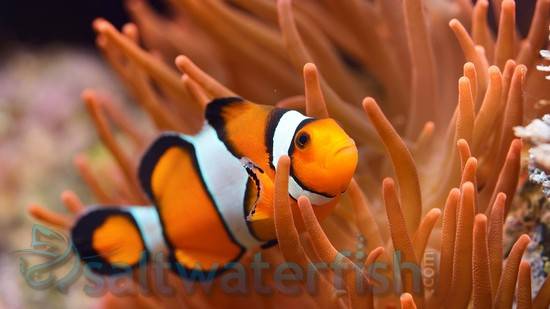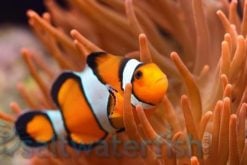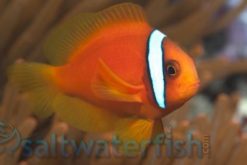True Percula Clownfish (Amphiprion percula) – Quick Stats
- Care Level: Easy
- Temperament: Peaceful
- Diet: Omnivore
- Reef Safe: Yes
- Minimum Tank Size: 20 gallons
- Max Size: 3 inches
- Water Parameters: pH 8.1-8.4, Salinity 1.020-1.025, Temperature 75-82°F
Comprehensive Guide: True Percula Clownfish (Amphiprion percula)
Habitat
The True Percula Clownfish, also known as the Orange Clownfish or Clown Anemonefish, is native to the warm waters of the Pacific Ocean, particularly in the Indo-Pacific region. They are commonly found in coral reefs, lagoons, and sheltered areas with anemones.
Reef Safe
The True Percula Clownfish is reef-safe and does not harm corals or other invertebrates. However, caution should be exercised when introducing them to anemones, as some anemones may sting or eat the clownfish.
Size
The True Percula Clownfish grows up to a maximum size of around 3 inches.
Temperament
These clownfish are generally peaceful and can be kept in community aquariums. They are known for their playful and active behavior.
Sexual Dimorphism
The True Percula Clownfish is a sequential hermaphrodite, meaning they can change their sex. The largest individual in a group will typically become the dominant female, while the second-largest will become the male.
Lifespan
In captivity, True Percula Clownfish can live for 5 to 10 years or even longer with proper care.
Diet in Aquariums
True Percula Clownfish are omnivores and have a varied diet. They can be fed high-quality flake or pellet food, frozen or live brine shrimp, mysis shrimp, and chopped seafood. It is also beneficial to include marine algae or seaweed in their diet.
Aquascaping Recommendations
When setting up the aquarium for True Percula Clownfish, it is important to provide plenty of hiding places and suitable anemones for them to host. Live rock structures with caves and crevices mimic their natural habitat and provide hiding spots.
Captive Bred Availability
True Percula Clownfish are commonly available as captive-bred specimens in the aquarium trade. Captive-bred fish are generally hardier and more adaptable to aquarium conditions compared to wild-caught specimens.
Compatibility with Other Fish, Invertebrates, or Corals
True Percula Clownfish is compatible with many peaceful fish, invertebrates, and corals. However, caution should be exercised when introducing them to aggressive or territorial species. Researching the compatibility of specific tankmates before adding them to the aquarium is always recommended.
5 Recommended Tankmates
- Ocellaris Clownfish (Amphiprion ocellaris) – These clownfish are closely related and can form a compatible pair.
- Firefish Goby (Nemateleotris magnifica) – Peaceful and colorful, they make great tankmates for clownfish.
- Banggai Cardinalfish (Pterapogon kauderni) – Another peaceful fish that can coexist with clownfish.
- Yellow Watchman Goby (Cryptocentrus cinctus) – These gobies are known for their interesting behavior and can be kept with clownfish.
- Green Chromis (Chromis viridis) – These schooling fish can add a vibrant touch to the aquarium and get along well with clownfish.
Other Common Names
The True Percula Clownfish is also known by other common names such as Orange Clownfish, Clown Anemonefish, and Percula Clownfish.
Why Buy from Reefs4Less.com
Reefs4Less.com is a reputable online retailer specializing in saltwater aquarium supplies. They offer a wide selection of high-quality fish, corals, and invertebrates, including True Percula Clownfish. With their expertise and commitment to customer satisfaction, Reefs4Less.com ensures that you receive healthy and well-cared-for specimens for your saltwater aquarium.
Popular Questions and Answers
- Q: Can True Percula Clownfish be kept in a small tank?
- A: While True Percula Clownfish can be kept in smaller tanks, a minimum tank size of 20 gallons is recommended to provide ample space to swim and establish territories.
- Q: Do True Percula Clownfish require anemones to survive?
- A: While True Percula Clownfish have a symbiotic relationship with anemones in the wild, they can thrive and live happily in aquariums without anemones. Providing suitable hiding places and structures is sufficient for their well-being.
- Q: Can True Percula Clownfish be kept in pairs?
- A: True Percula Clownfish can be kept in pairs. They form monogamous bonds and will often establish territories together.
- Q: Are True Percula Clownfish aggressive towards other fish?
- A: True Percula Clownfish are generally peaceful but may become territorial and aggressive towards other clownfish or similar species if their territories are threatened.
- Q: Can True Percula Clownfish change their sex in captivity?
- A: True Percula Clownfish can change their sex in captivity, just like in the wild. The largest individual will typically become the dominant female, and the second-largest will become the male.






Reviews
There are no reviews yet.